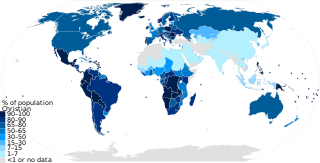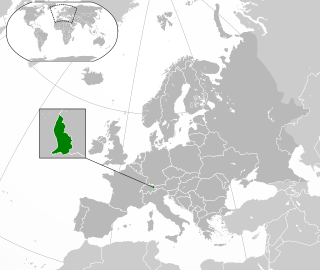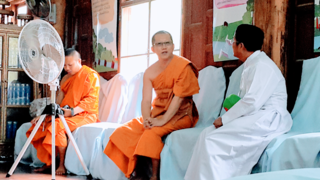Related Research Articles

Buddhism in Nepal started spreading since the reign of Ashoka through Indian and Tibetan missionaries. The Kiratas were the first people in Nepal who embraced the Buddha’s teachings, followed by the Licchavis and Newar people. Buddhism is Nepal's second-largest religion, with 8.2% of the country's population, or approximately 2.4 million people, identifying as adherents of Buddhism in a 2021 census.
Buddhism is not officially recognized as a religion in Slovakia. As of January 2021, Buddhists numbered 6,722 or 0.12% of the population.

As of the year 2023, Christianity had approximately 2.4 billion adherents and is the largest religion by population. According to a PEW estimation in 2020, Christians made up to 2.38 billion of the worldwide population of about 8 billion people. It represents nearly one-third of the world's population and is the largest religion in the world, with the three largest groups of Christians being the Catholic Church, Protestantism, and the Eastern Orthodox Church. The largest Christian denomination is the Catholic Church, with 1.3 billion baptized members. The second largest Christian branch is either Protestantism, or the Eastern Orthodox Church.

The majority of Vietnamese do not follow any organized religion, instead participating in one or more practices of folk religions, such as venerating ancestors, or praying to deities, especially during Tết and other festivals. Folk religions were founded on endemic cultural beliefs that were historically affected by Confucianism and Taoism from ancient China, as well as by various strands of Buddhism. These three teachings or tam giáo were later joined by Christianity which has become a significant presence. Vietnam is also home of two indigenous religions: syncretic Caodaism and quasi-Buddhist Hoahaoism.

The Catholic Church in Liechtenstein is part of the worldwide Catholic Church, under the spiritual leadership of the Pope in Rome.

Religion in Nepal encompasses a wide diversity of groups and beliefs. Nepal is a secular nation and secularism in Nepal under the Interim constitution is defined as "Religious and cultural freedom along with the protection of religion and culture handed down from time immemorial." That is, "The state government is bound for protecting and fostering Hindu religion while maintaining "Religious" and "Cultural" freedom throughout the nation as fundamental rights.

Religion in Taiwan is characterised by a diversity of religious beliefs and practices, predominantly those pertaining to the continued preservation of the ancient Chinese culture and religion. Freedom of religion is inscribed in the constitution of the Republic of China (Taiwan). The majority of Taiwanese people practice a combination of Buddhism and Taoism often with a Confucian worldview, which is collectively termed as Chinese folk religion.

The history of the Jews in Liechtenstein goes back nearly a century, in particular to the time of the Holocaust.

Islam is a minority religion in Liechtenstein.

Christianity is the predominant religion in Uganda. According to the 2014 census, over 84 percent of the population was Christian, while about 14 percent of the population adhered to Islam, making it the largest minority religion. Anglicanism and Catholicism are the main Christian denominations in the country.

Buddhism has been present in the Middle East and influenced some Middle Eastern religions such as Manichaeism. Buddhism, per some estimates by early medieval Muslim scholars such as Al-Biruni, was present from Eastern ancient Persia up to the frontier of Syria before the advent of Islam.
Bhutan is a Buddhist country culturally, socially, politically, and constitutionally, and Buddhism plays a vital role in the cultural and spiritual heritage of the nation.

Christianity is the largest religion in Uruguay, with Catholics having the most adherents, but around 44.5% of the population is non-religious as of 2021. Church and state are officially separated since 1916.
Myanmar (Burma) is a Buddhist majority country with a significant minority of Christians and other groups residing in the country.

Islam is the dominant religion in Libya.

The Constitution provides for freedom of religion, and the government has generally respected this right in practice. Buddhism is the state religion.

According to the 2018 census, Buddhism is the largest religion in Thailand, practiced by over 94% of the population; Islam makes up 5% of the population. The Thai government officially recognizes five religions: Buddhism, Islam, Hinduism, Sikhism, and Christianity.
Christianity is the dominant religioninPalau, practiced by around 72.8% of the total population, according to the 2022 census. Freedom of religion is enshrined in Palau's constitution.
TIn 1991, the Bangladesh Bureau of Statistics, conducted a national census in Bangladesh. They recorded data from all of the districts and upazilas and main cities in Bangladesh including statistical data on population size, households, sex and age distribution, marital status, economically active population, literacy and educational attainment, religion, number of children etc. According to the census, Hindus were 10.5 per cent of the population, down from 12.1 per cent as of 1981.
The religion in Liechtenstein is predominantly Catholic, with a minority of Protestants, non-adherents, and adherents of other religions; it also has a small Muslim population, composed mainly of immigrants from countries including Bosnia and Herzegovina and Turkey.